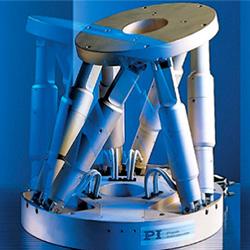Our automation work provides opportunities for the upskilling of existing labor through the maintenance and programming of automation solutions and creates cost savings that make increased pay possible.
Identifying, Developing, and Implementing Automation Solutions in Mid-Size Manufacturing
Miles Anderson, VP | MiddleGround Capital
Tell us about yourself and your role with MiddleGround Capital.
I am Miles Anderson, and I am the Vice President of Automation at MiddleGround Capital. My team is responsible for identifying, developing, and implementing automation solutions at companies within the MiddleGround portfolio. Our work creates equity value for investors by helping to close the workforce availability gap and assist portfolio companies in achieving KPI targets on critical processes. We also make measurable improvements to our manufacturers’ lives by supporting MiddleGround’s $25 by 2025 initiative. This initiative aims to increase our U.S. portfolio company minimum wage to $25/hour for any full-time employee. Our automation work provides opportunities for the upskilling of existing labor through the maintenance and programming of automation solutions and creates cost savings that make the increased pay possible.
Summarize the mission of MiddleGround Capital and the role it plays in the manufacturing industry.
In the world of private equity, we set ourselves apart with our operational expertise and our emphasis on true partnerships. Two of our three Founding Partners got their start as Operators at Toyota and our entire automation team was hand-selected from multiple technical disciplines within Toyota. This has allowed us to carry over a hands-on operational approach and technical skill set for identifying process waste, opportunities for automation, and ultimately streamline the manufacturing process for reduced operational expense.
We are active partners, with boots on the ground to help our manufacturers face problems and create sustainable ways to grow their businesses. You can rely on us to be partners when things are going well and to get involved when times are less certain.
How do you identify and select the automation projects across your portfolio?
Keeping our people safe is priority number one, so if there is a process that is unsafe for our T/Ms, which can include ergonomic dangers that creep over time, we will always put automation of that process above all others to create a safe work environment.
Once safety is ensured, we prioritize based on the potential for equity value creation. This starts with reviewing our portfolio financials and multiple to identify which portco has the potential to generate the largest return for our investors. We visit the facilities in person and generate a list of all automation opportunities alongside the budgetary cost and ROI for each. From the list, we can also prioritize based upon the number of duplicate installations because this allows us to minimize design costs by utilizing the same design across multiple installation locations for quicker implementation.
Can you give me a recent automation project that you’re particularly proud of? Can you share the measured impact of that project (in dollars, efficiency, waste reduction, etc.)?
We are particularly proud of the pushrod former automation that was performed at Race Winning Brands – Trend Performance Division in Warren, Michigan. This was an opportunity to utilize the same design across four duplicate installations and allowed us to reallocate four T/Ms to either fill gaps in the manufacturing line elsewhere or to other more meaningful roles.
Going into more detail, what expertise did you need on your team to bring this project to life? Would this have been attainable for the portco without MiddleGround?
The expertise to develop this type of automation included not only mechanical, electrical, and pneumatic design experience but also a strong understanding of the manufacturing process and the ability to identify and eliminate waste. The MiddleGround Capital Automation Team ensured that all necessary mechanical measurements and electrical interface criteria were gathered ahead of time, in addition to taking the time to explore the process with an Operator’s point of view to ensure that a full understanding of the process was gathered prior to designing the automation solution.
Without the MiddleGround Automation Team leading the implementation of the pushrod former automation, Race Winning Brands would have had significant challenges with finding an outside source that would have provided such a robust solution custom designed from the ground up with manufacturing (ease of use, maintenance, and backup) in mind at such a low cost.
What were some of the learnings from completing this project?
From the pushrod former project, we learned that we can make a meaningful impact to the job satisfaction of our T/Ms. The standardized work for that process was extremely simple and the process was very monotonous, each of the T/Ms were running approximately 3,000 parts per shift.
It’s incredible to receive such positive feedback from the manufacturing staff. This automation project has given them the opportunity to be either upskilled into higher-paying roles (tending the automation and troubleshooting jams) or reallocated into more meaningful positions. In the words of one of the T/Ms, “This is 3 million percent better.”
How does the MiddleGround Automation Team help the portfolio operate better overall, outside of these large-scale automation projects?
In addition to implementing automation solutions, MiddleGround has launched a Maintenance Team that works in parallel to the Automation Team. The Maintenance Team is focused on supporting portfolio companies through machine breakdown root cause analysis, implementation of preventative and predictive maintenance systems, and identification and sourcing of critical spare parts. Having a close relationship between maintenance and automation encourages the sharing of technical expertise and resources if projects or a major breakdown require it.
The content & opinions in this article are the author’s and do not necessarily represent the views of ManufacturingTomorrow
Comments (0)
This post does not have any comments. Be the first to leave a comment below.
Featured Product

